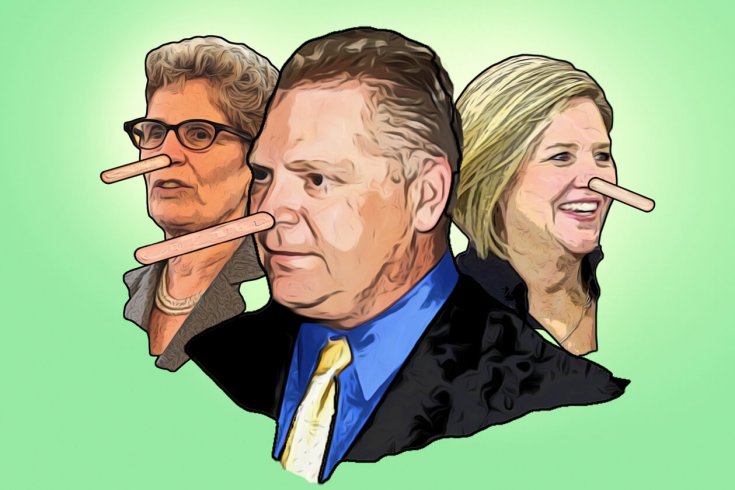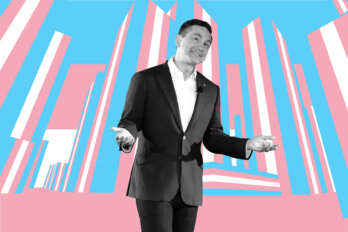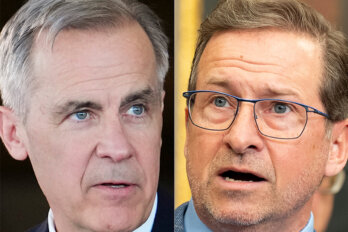We’ve always tolerated a certain amount of deceit in politics. There’s the old joke about knowing a politician is lying because their lips are moving. While recent decades have seen some of the most obscene untruths imaginable—“I am not a crook,” “I did not have sexual relations with that woman,” “I do not use crack cocaine”—misleading voters tends to be a relatively mundane affair, with most lawmakers following Mark Twain’s advice to prevaricate “thoughtfully, judiciously.”
Donald Trump, and his strategy of nonstop disinformation and misdirection, has changed that. He has made it easier for politicians to go beyond tweaking the truth to outright making it up. Yet the word lie terrifies journalists—as it should. Using it strips us of our perceived sense of objectivity. For a lie to be a lie, you need to believe that the liar is lying with intent. Not only is their statement untrue but the speaker knows—or should know—it’s untrue. Yet pretending all lies are subtle and well-intentioned false claims encourages a journalistic equivocation that is increasingly dangerous in our era of fake news.
The provincial election in Ontario right now is one of the most competitive, interesting, and mystifying in recent memory. It’s also one that threatens to sully the art of lying. Andrea Horwath, surprise leader in the polls and potentially the province’s first NDP premier in two decades, has used her campaign to paint a dystopian picture of Ontario, one where the unlucky are out on their ass and the rich have assumed absolute control. At the final leaders’ debate in Toronto on Sunday, Horwath told the audience dire stories about living in the country’s most prosperous province—single mothers being forced to visit the food bank, for instance—and that after “years and years of Liberal government, things have gotten harder and not better.”
But, by virtually every metric, that’s not quite true. Unemployment is as low as it’s been since the start of the millennium. True, there are now more low-income Ontarians, but that number appears to be trending downward. GDP growth is clipping along. Horwath presumably knows all this. Her mission is to play to how voters feel about the economy, not to describe the economy as it is. After all, why risk change when the status quo really isn’t so bad? On the other end of that dystopian picture are Horwath’s promises for massive new social programs, the costs of which are almost certainly understated in her campaign documents—costs that will magically expand if she wins government.
Premier Kathleen Wynne spent the debate peddling half-truths in a more organized way. When Wynne’s Liberals prepared Ontario’s final budget before the province plunged headlong into an election, she tried to gin up the books to hide some $5 billion in hydro subsidies on the provincial ledger. While politics can tolerate a certain amount of inexactitude when it comes to the budget, her math earned particular scorn from the province’s auditor general.
When I asked the premier after the debate whether it was hypocritical for her to be lecturing others on their shaky numbers, she brushed it off, saying, “Both parties are using exactly the same numbers we used.” She went on to say her government has been “very transparent” in its finances. I pointed out that a lack of transparency is exactly what the government were chided for by the provincial auditor. She called it an “accounting disagreement,” which is an amusing way of admitting that your auditor said you were lying.
But, for both Wynne and Horwath, at least those half-truths and misrepresentations fall within the realm of acceptable political gamemanship. Both can probably make the case that their statements sit somewhere between fact and lie—truth adjacent, even. Wynne, yes, added significant amounts to the public debt, but she did so, in part, to lower Ontario’s hydro rates. And Horwath’s indictment of Wynne’s Ontario is certainly an overstatement, and the NDP leader’s own plans are certainly going to be more costly than she is letting on, but the issue Horwath is tackling—affordability—is becoming a legitimate problem in this province.
The surprise Progressive Conservative leadership victor has taken the dirty art of lying and made it even more disreputable. For starters, Ford has, just eight days before an election—and after the final leaders’ debate—finally released a platform with dollar figures attached. His failure to do so for most of the race was a constant theme of debate Sunday night, with both his opponents howling over the fact that Ford has attacked their spending plans while presenting no details of his own. When he’s confronted with that fact, he tries to bullshit his way out of it.
Ford’s behaviour matters. We have a set of norms in this country: we expect parties to put out a spending breakdown of what they want to do and to take the questions about it, so that, if they get into office, we can hold them to the promises they’ve won on, or we opt not to put them into office in the first place. Look at Tim Hudak, who was a PC leader before Ford. He promised to get the budget balanced by laying off 100,000 public-sector employees. He respected voters enough to give them they choice, and they gave him a hard “no thanks.”
Even so, that’s how this is supposed to work. If we jettison those norms, elections will slide even further into meaningless pageants. At that point, journalism will matter less, and cults of personality will become more entrenched as partisans of one stripe will be more than happy to believe a lie—or, at least, equivocate between it and the truth. If the truth is relative, then we may as well just elect a magic eight ball.
Doug Ford’s bafflegab is something to behold. He’s always the first to complain about Ontario’s debt—one of the world’s largest subnational debts, according to a 2014 Fraser Institute report—and yet has literally no plan to address it. In fact, he’ll make it worse.
As part of his spending program, Ford has promised to axe the federally mandated carbon-pricing system; abolishing it, he says, will cost “$1.9 billion per year to be offset by eliminating corresponding slush fund.” In other words, Ford is going to eliminate the cap-and-trade system (which is mandated by federal legislation, though Ford says he’ll allocate $30 million to fight the government in court) and then eliminate the programs it funds and call it breaking even.
There’s more. He has committed to a one-point cut to the corporate tax rate in his second year—that’s a loss of $1.3 billion annually. Then there’s two points off the second tax bracket, starting in year three, at $2.26 billion per year. Lowering the gas tax would be $1.19 billion per year. Eliminating income tax for minimum-wage workers: $558 million. Child care tax credit: $389 million.
All in, that’s nearly $10 billion that will be added to Ontario’s existing $11 billion deficit.
In the whole platform, which is little more than bullet points on the PC Party’s website, the party offers up only a single idea on how to reduce the deficit: $270 million in savings from “ending corporate welfare.” The platform indicates no new revenue sources at all.
Ford brags that those measures will lighten the tax burden for many, but he refuses to admit that he’ll need to pay for them somehow. Oh, but lest you worry that Ford isn’t thinking all this through, he recently pledged to bring back “buck a beer,” supposedly by lowering or eliminating the minimum price for alcohol—despite virtually no beer being sold at the minimum price. It’s just another time where Ford has made some wild promise accompanied with a plan that wouldn’t achieve the outcome he’s promised.
At the debate Sunday night, Ford swore that he’ll pay for all his promises without laying off a single employee. When pressed about how he intends to do that, Ford goes to the same well every time: “Do you think there’s not four cents on the dollar of savings in the bloated government of Ontario?” he asked rhetorically during a recent interview with the CBC. He has consistently refused to elaborate on what sits in that mythical 4 percent that he’ll find and eliminate on Ontario’s books. That number appears to be tied to little besides wishful thinking.
The lies pile up quickly. In the debate, he also managed to suggest that the NDP’s candidates took their inspiration from Hitler, because one candidate shared an (offensively stupid) meme of the führer, and that Bob Rae, as NDP premier, caused a worldwide recession that began before his term in office.
But those are not the most odious of Ford’s untruths. When he was asked Sunday night, Ford repeated his mantra: he’d find efficiencies at Queen’s Park just like he found efficiencies at Toronto city hall. Now, Ford’s assertion that he “saved” $1.1 billion in the city budget is a mystifyingly resilient lie. It’s one he weaponized during his failed run for mayor in 2014. It’s one he leveraged to win the Ontario PC leadership. It’s one that has become a pillar of his bid for premier.
Ford, of course, wasn’t mayor. His brother was. So his claim that he did anything is, in and of itself, a bit disingenuous. But the real problem lies in the $1.1 billion claim. It’s just not true. Now, I’m not the first writer to tackle this. Edward Keenan did the math in the Toronto Star last month. Just the same, I ran the numbers: when Rob Ford was elected mayor, the City of Toronto and all of its agencies and utilities spent $9.3 billion a year. In 2014, when he left office, that number was nearly $9.7 billion. That increase in spending was not offset by a commiserate boost in revenues, and thus property taxes were needed to fill the gap.
In short: the Fords did not “save” Toronto $1.1 billion. In Doug Ford’s own words, they cost the city $750 million. When I asked Ford’s campaign to justify the numbers, it sent along a response that had been prepared by Ford’s 2014 mayoral campaign. What the reply offers up is galling. It claims, among other things, that the Fords “eliminated the Personal Vehicle Tax,” which resulted in “$200 million direct savings.” In other words, the Fords reduced government revenue by $200 million, over four years, and claimed that figure as a part of their $1.1 billion in government savings. It’s a breathtaking lie, and it’s one that Doug Ford has repeated for years.
The vast majority of the $1.1 billion figure comes from a supposed collection of $761 million in cost reductions and efficiencies supposedly found by the Fords during their four-year stint. That figure is—surprise, not what Doug Ford claims it to be. This number is underpinned by four years of spending fluctuations that are entirely common in any budget. Programs start and stop, and, yes, employees get laid off.
That last detail leads to a frustrating aspect of Ford’s mantra in this election. Namely, that nobody will lose their jobs. “Let me be clear: no one is getting laid off,” he told the Star in March. And yet a whole whack of this efficiency money he’s pointing to from his time at city hall comes from layoffs. For example, he’s factoring in $327 million in “cost reductions and efficiency savings” from the 2012 Toronto budget. A third of that money came from the elimination of 1,268 full-time city jobs and 271 part-time ones. And those jobs were only cut because the budget had a shortfall. The layoffs included hundreds of jobs in the TTC, which is buckling under the strain of funding shortfalls. And this is just in one year.
Ford often brags about the audit he ordered while at city hall, which supposedly identified heaps of savings. He’s even using it again: in his platform, if you can call it that, Ford pledges to “order a line-by-line audit of government spending to bring an end to the culture of waste and mismanagement in government.”
But that audit at the City of Toronto suggested a massive sell-off of city assets, and most of the proposals were so untenable that the Fords ignored them, ultimately trimming just $16 million in spending. The audit cost $3.5 million
I am fascinated by any politician’s ability to lie this way. As a journalist, I need to cling to the belief that if I confront a dishonest politician with the truth, they’ll break down and confess to their deception. After all, that’s supposed to be the basis of our democratic system: politicians telling inexactitudes, half-truths, and outright whoppers, and journalists catching them. So, after the debate on Sunday, I gave it a go. When Ford stepped out to, supposedly, answer journalists’ questions, I laid out the problems with Ford’s numbers and asked: “Why do you keep saying it, if it’s not true?”
“My friends, you weren’t on budget, I was,” Ford began. He proceeded to go on a tangent that I won’t repeat here, because it is largely buttressing for the architecture of the untruth. At one point, he said the Toronto Star reported that the $1.1 billion was, in fact, $700 million, which is not what it reported. “We’re the only ones with the proven track record, that did said what we said we were going to do, which was save the taxpayers money,” he went on. Of course, that’s not true. “Not one single person got laid off,” he added. Of course, hundreds were.
I interjected: “Does the truth matter in this campaign?”
“The NDP, they’re very untruthful, they’re terribly untruthful,” he pivoted.
It’s an awfully rich deflection, but it’s also a deeply cynical view that, yes, I may be peddling in numbers I know to be wrong, but, hey, so are the other folks. Ford, however, is exceptional. That’s because his lies live nowhere near the truth. That’s what separates him so entirely from norms in Canadian politics. Lots of politicians play fast and loose with the truth. Lying is so ingrained in our political system that it would be hard to imagine democracy without it. But if we give politicians carte blanche to lie so, so boldly, so bigly, then journalism will become an avenue only for those who care about the truth and facts will become something to cast aside by the partisans encouraged to ignore them at all costs.




